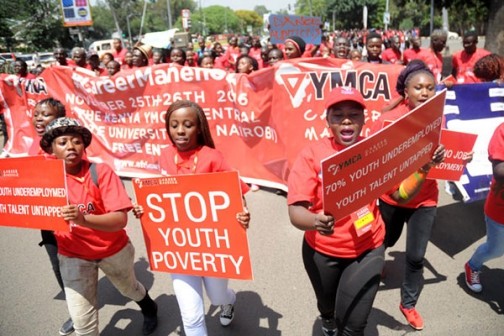Poverty and Depression as a Result of COVID-19 Has Affected The Youth In Kenya.
Covid-19, the disease caused by the coronavirus, has adversely affected the mental and socioeconomic well-being of young Kenyans, a new survey reports.
The study, which was conducted by AMREF Health Africa between April 30 and May 5 across all the 47 counties, in alliance with the Ministry of Health, Population Council and Youth in Action, indicates that the effects of Covid-19, such as loss of jobs, have heightened stress levels among young people, worsening their mental and health well-being.
“Covid-19 is having significant negative effects on the mental health, economic and social status of the youth: nearly a third (27 percent) are experiencing more stress and 30 percent have reported living in fear,” the report notes.
SEE ALSO: The Corona Hairstyle Is Spreading An Important Message About Covid-19 In Kenya

Economic Effects
The main source of worry and stress for young people is the reduction of income and complete loss of jobs amidst rising expenses, the report says.
This is as 50 percent of young Kenyans have suffered from a significantly reduced income whereas 22.9 percent of the Kenyan youth have lost their source of livelihood due to the virus epidemic.
The report also added, “34 percent of young Kenyans experienced increases expenses in the house and 33 percent experienced an increase in food prices, with more females than males experiencing an increase in household expenses (36.7 percent vs 31.9 percent) and increase in food prices (34.5 percent vs 32.6 percent”.
Ballooning violence
According to the findings of the report, the group also recorded an increase in violence at home. 1.7 percent of the respondents revealed that they have been victims of violence at home during the pandemic period.
The changes in normal roles and routines create stress for family members, including children who cannot attend school and may not know why they cannot.
Additionally, parents must struggle to strike a balance between explaining the pandemic to their children without heightening their fear.
For parents who also double up as health care workers, the conflict between being professionals and infecting their families become real.
These conflicts are likely to cause feelings of guilt, fear, and anxiety, among others.
Lastly, as home environments become toxic due to depressed affect, school closures, and diminishing resources among others, the odds of family violence increase.
SEE ALSO: Fighting Against Gender-Based Violence During The Covid-19 Pandemic in Kenya
Mental Health
Fear, worry, and stress are normal responses to perceived or real threats, and at times when we are faced with uncertainty or the unknown.
So it is normal and understandable that youth in Kenya are experiencing fear in the context of the COVID-19 pandemic.
Added to the fear of contracting the virus in a pandemic such as COVID-19 are the significant changes to our daily lives as our movements are restricted in support of efforts to contain and slow down the spread of the virus.
Most are struggling with anxiety and depression because they are faced with new realities of working from home, temporary unemployment, home-schooling of children, and lack of physical contact with other family members, friends, and colleagues.
Police Brutality
At least six people died from police violence during the first 10 days of Kenya’s dusk-to-dawn curfew, imposed on March 27, 2020, to contain the spread of Covid-19. As of today, the number has shot up to 12 which includes children.
The police, without apparent justification, shot and beat people at markets or returning home from work, even before the daily start of the curfew.
Police have also broken into homes and shops, extorted money from residents, or looted food in locations across the country.
It is shocking that people are losing their lives and livelihoods while supposedly being protected from infection.
Police brutality isn’t just unlawful; it is also counterproductive in fighting the spread of the virus.
SEE ALSO: Tips For Parents During The Coronavirus Outbreak – Infographics
Access To Medical Care
Five percent of women cannot access emergency pills or sanitary towels due to the movement restrictions, while eight percent of men reported a lack of access to condoms.
Youth with HIV have also been affected adversely, with 2.3 percent saying that Covid-19 has cut off their access to ARV medication and 4.7 percent noting that they are unable to access HIV/AIDS counseling.
Additionally, nearly half of the young people surveyed indicated that they would not be able to self-isolate if infected with Covid-19 due to reduced income or loss of jobs, which makes them unable to afford isolation.
Diseases will not also wait for coronavirus to be over!!
SEE ALSO: How To Manage Your Mental Health During Self Isolation
Conclusion
Regardless of these effects, the report shows that an overwhelming majority of young Kenyans are taking the necessary precautions.
They are adopting positive behavior to avoid infection with Covid-19, practicing hand hygiene, and wearing personal protective equipment since they started to receive messages on Covid-19.
For instance, 99 percent of young people are avoiding travel, 98 percent are using masks in public, 98 percent are washing hands, and 20 percent using hand sanitizers.
Little is known about the experiences of our people under public health protocols in terms of compliance, difficulties, and psychological impact.
The resulting interruption of filial and other bonds due to fears about infecting self and others, and/or avoidance behaviors during and post-isolation are issues of concern to social scientists.
Further, public health protocols that directly contradict long-held traditions, for instance, concerning how and when burials are to be conducted has ramifications for their success.
Finally, fear of social stigma for those infected may cause people to deny early symptoms and consequently fail at early diagnosis.
It is important to note that early diagnosis is essential for the management of a new disease as COVID-19.
Therefore, it is important to understand how people perceive interventions and what psychological mechanisms are triggered by coercive measures.